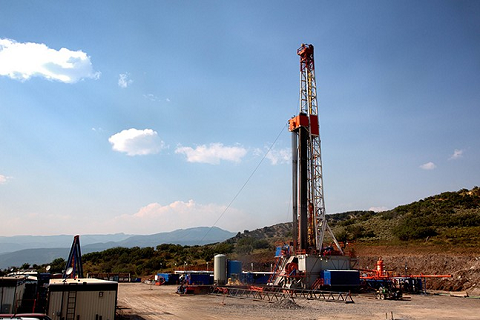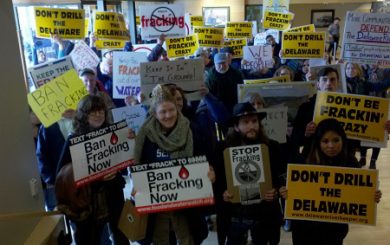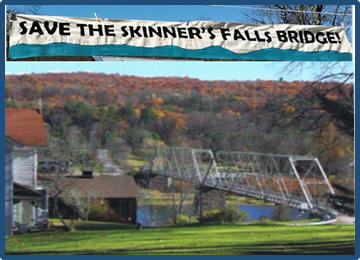
DE, NJ, NY and PA Voter Information
August 31, 2020
Poll Says Pennsylvanians Support More Regulations on Fracking
September 11, 2020Why Are The Exemptions to Federal Laws Important to the Delaware Basin? How The Fossil Fuel Industry Wants to Make You Pay – And How You Can Help Fight Back!
The DRBC commissioners take their marching orders from the governors of Delaware, New Jersey, New York and Pennsylvania. If you are a resident of (or have interest in) one of these states, a postcard to your governor can help bring the full ban to a vote in the DRBC (even if you have sent postcards before). Now is the time to pass a full ban on fracking in the Basin! Together we can make it happen!
It has been almost 3 years since the Delaware River Basin Commission (DRBC) proposed regulations to ban fracking in the Delaware River Basin. The proposed regulations, however, would allow the import of frack waste into the Basin and the export of Basin water to support fracking elsewhere.
DCS has been fighting not only to get the fracking ban enacted, but to enact a FULL BAN on fracking related activities. A full ban would ban the import of frack waste and the export of our water.
Below are recent comments that DCS has made to the DRBC that will give you points to use when you write to your governor – or talk to your brother-in-law! These comments are focused on the federal exemptions the oil and gas industry fought for over 25 years to obtain and how inviting frack waste into the Delaware Basin will have some profound impacts because of these exemptions.
Note on the federal exemptions: The DRBC does not seem to recognize the importance of the exemptions to major provisions of protective federal laws that the oil and gas industry holds. The exemptions are important because they relieve the companies of liability for damages their activities cause. The costs of the damages are shifted to the communities (near the wells and other facilities) and downstream including global impacts on climate.
Federal environmental laws are a ‘floor’, meaning that unless specifically prohibited, states can make stronger regulations. Recently NY eliminated the 1980’s exemption making oil and gas wastes ’special’ by re-classifying those toxic waste as ‘hazardous’ – placing them under the federal Resource Conservation and Recovery Act so they are followed ‘cradle to grave’ and must be disposed of properly to avoid toxic contamination, potentially ending the current importation and dumping of gas and oil drilling wastes in NY landfills. All the other exemptions remain in NY and in all the US. The wastes the DRBC wants to import ARE toxic, hazardous, unregulated wastes from drilling in Pennsylvania. That is why we need a FULL BAN NOW!
DRBC Meeting June 10, 2020
SPOKEN COMMENT – from B. Arrindell, Director, Damascus Citizens for Sustainability (DCS)
First I would like to acknowledge the increased impacts to environmental justice communities, where air and water pollution is so much greater and the magnitude of Covid suffering and deaths are the largest. With US Covid deaths close to 115,000 – 115 thousand! – environmental in-justice communities will only suffer more unless the DRBC acts.
Waste from oil and gas mining was re-named ‘special’ by the Bentsen amendment to the federal Resource Conservation and Recovery Act (or RCRA) in 1980 so that these wastes would not be regulated as the toxic materials that they are. RCRA takes a “cradle to grave” approach to ensure wastes are handled properly from the point of creation to final disposal. As ‘special’ wastes, produced water from drilling is unregulated. Also then the gas and oil companies were isolated from the liability they would have if this waste was regulated as toxic. Because it is labeled ‘special’ does not mean that it is not toxic – it is toxic and many of the chemicals in it are very harmful even in tiny amounts when they act as hormones. For example, studies of humans and horses show that exposure to this chemical laden waste causes increased birth defects and cancers, among other impacts.
Regulatory constraints are the obligation of government to protect health and safety. It is the DRBC’s mandate to protect and preserve the Basin and its resources for current and future residents, human and otherwise – it is our home. That the DRBC would consider allowing these wastes into the Delaware Basin in order to “regulate” them is short-sighted and a false economy of effort. It is always better to prevent pollution rather than attempt to clean up after. Because of the unregulated nature of these materials, how would the DRBC know what and how much wastes are coming into the Basin in order to ‘regulate’ their transport and disposal. The DRBC is asking for the illegal dumping and trucking accidents that happen regularly in other areas. We depend on the DRBC to keep the Delaware Basin healthy – the wastes should not be allowed into the Basin and should be banned with the high volume fracking already proposed. These pollution risks are too dangerous to allow; DRBC must ban fracking and all its activities. Please call the vote.
DRBC Meeting June 10, 2020
Submitted written COMMENT on Specific Fracking Impacts – from B. Arrindell, Director, DCS
- Waste from oil and gas mining was re-named ‘special’ by the Bentsen amendment to the Resource Conservation and Recovery Act (or RCRA) in 1980 so that these wastes would not be regulated as the toxic materials that they are. RCRA takes a “cradle to grave” approach to ensure wastes are handled properly from the point of creation to transport to disposal. As ‘special’ wastes, drilling fluids, produced water, hydraulic fracturing fluids are unregulated toxic substances. Additionally, that change isolated the gas and oil companies from the liability they would have if this waste was regulated as toxic under RCRA. Because it is labeled ‘special’ does not mean that it is not toxic – it is toxic and very harmful. The liquid wastes contain carcinogens, endocrine disrupting chemicals, heavy metals, poisonous hydrocarbons, radioactivity and extremely high salt content. Included in the mix are the toxic BETX materials, benzene, ethylbenzene, toluene and zylenes. With the other volatiles in these mixtures, when they are “treated,” which is usually a dilution process, they are both left in the receiving water body and released into the surroundings as poisonous, smog producing air pollution. These health risks are too great a risk to allow; DRBC must ban fracking and its activities.
- That the DRBC would consider allowing these wastes into the Delaware Basin in order to “regulate” them is short-sighted and a false economy of effort. It is always better to prevent pollution rather than attempt to clean up after. Because of the unregulated nature of these materials, how would the DRBC know what and how much wastes are coming into the Basin in order to ‘regulate’ their transport and disposal. The DRBC is asking for the illegal dumping and trucking accidents that happen regularly in areas near drilling. We depend on the DRBC to keep the Delaware Basin healthy – the wastes should not be allowed into the Basin and should be banned with the high volume fracking already proposed. These pollution risks are too dangerous to allow; DRBC must ban fracking and its activities.
- The oil and gas industry has unprecedented exemptions from our nation’s most important environmental and public health laws, including the Safe Drinking Water Act, Clean Air Act, and the Clean Water Act, Resource Conservation and Recovery Act, the Community Right to Know Act and more. Because the industry has known for decades about their inability to prevent damages from the drilling and from their liquid and solid wastes they sought exemptions to avoid liability for the damages they knew they would cause. First by making the wastes, ‘special’ via the Bentsen Amendment to the RCRA law in 1980 so that the wastes from oil and gas exploration and production are not tracked or manifested and needn’t be disposed of as the toxic materials they actually are. Then after about 25 years of trying the industry got exemptions to major provisions of 7 protective environmental laws in the 2005 Energy Policy Act. The more I learned about the contents of and the potential impacts from these wastes the more alarmed I have become. These pollution risks are too dangerous to allow; DRBC must ban fracking and its activities.
- The amounts of many of the chemicals in the wastes the DRBC is proposing to import may sound small, but many behave like hormones and are harmful in very tiny amounts. Studies in humans and horses show that exposure to the chemical laden wastes causes increased birth defects. Regulatory constraints are the obligation of government to protect health and safety. The Delaware River Basin is not for sale to the highest bidder or as a favor to a business associate – it is our home and it is the DRBC’s mandate to protect and preserve the Basin and its resources for current and future residents, human and otherwise. Drilling must be banned and resulting wastes must not be imported in the Delaware Basin. These health risks are startling and too great a risk to allow; DRBC must ban fracking and its activities.
DRBC Forum August 20, 2020
COMMENT – from B. Arrindell, Director, DCS
The recent PA Grand Jury report on fracking pointed out that fracking wastes enjoy federal exemptions that make it easier and cheaper for these companies to dispose of waste. The exemption that allows frack wastewater to be handled as if it is not hazardous, even though it contains hazardous materials, has led to unwarranted damages due to unsafe handling and disposal. Pollution incidents in PA exposed people and the environment to avoidable hazards. FROM THE GRAND JURY REPORT: “This wastewater may be composed mostly of brine and relatively harmless constituents, or it may be full of extremely dangerous chemicals or highly radioactive. There is no way to tell, however, because the industry is not required to identify or manage its wastewater for what it actually contains. Due to exemptions under federal law, trucks carrying fracking wastewater in Pennsylvania are not placarded as hauling hazardous waste, even though they may be carrying hazardous waste.” pages 20-21 of the Grand Jury report
Five of the Grand Jury’s 8 conclusions of harms are related to exemptions held by oil and gas from major provisions of 7 protective federal laws, the Clean Air Act, the Clean water Act, the Safe Drinking Water Act, the Community Right to Know Act, the Resource Conservation and Recovery Act or RCRA – and much more.
We submitted public comments to the DRBC so they know about these exemptions including about the hazardous waste loophole that re-named the wastes as ‘special’! As ‘special’ – wastes generated from oil and gas exploration and production are exempt from regulation under Subtitle C (hazardous waste management) of RCRA – and exempt from RCRA’s cradle to grave oversight of toxic-hazardous materials. The exemptions reduce the companies’ expenses while removing their liability for environmental and public health damages the companies’ wastes cause, placing that liability on the local and downstream communities. Because it is labeled ‘special’ does not mean that it is not toxic – it is toxic! and many of the chemicals in it are very harmful even in tiny amounts when they act as hormones. For example, studies of humans and of horses show that exposure to this chemical laden waste causes increased birth defects and cancers, among other impacts. Allowed releases will include harmful contaminants – the Delaware River should not be treated as a sewer.
The EPA agrees in this 2018 report, that the wastewater has negative impacts on water quality, aquatic life and potentially public health – with harm that can persist for years. EPA also shows that the likelihood of spills increase as the volume of wastewater and number of trips increase. The increased volume of wastewater produced today from much longer well bores is larger than DRBC predicted in its draft regs analysis. This means substantial risk of pollution from spills, accidents and deliberate dumping if wastewater were to be transported into the Delaware River Basin for treatment and disposal. In the draft gas regulations, DRBC has not acknowledged the occurrence of spills, accidental releases and dumping that will occur and proposes no plan to prevent the waste spills and accidents that are so prevalent elsewhere. DRBC proposes no special hazardous waste handling. Why would they propose importing these poisons? – to whose benefit? DRBC’s job is to protect the Basin from just this type of harm.
DRBC would be unnecessarily opening the Watershed to hazardous frack waste if the draft gas regulations are enacted, with federal exemptions intact – only New York State has recently changed that. Of course, what would be better is to keep the current prohibition. The dangers of pollution from improper and unsafe waste disposal, transportation accidents, spills, and dumping cannot be tolerated as they are a threat to the environment, water resources, and public health. This is a lesson learned from the Grand Jury.





2 Comments
Well it’s about time we as can country stop all these practices that will eventually kill our grandchildren. We must stop fracking forever in the Deleware valley and anywhere in nys. We must stop committing environmental suicide. We must not allow poisonous gas,oil and other hazardous materials travel under and above our nys lands. Let us try promote life and health instead of promoting illness and sickness for us and our animal neighbors . Please save our state
We agree, Theodore! And, we’re continuing the fight to stop gas drilling!